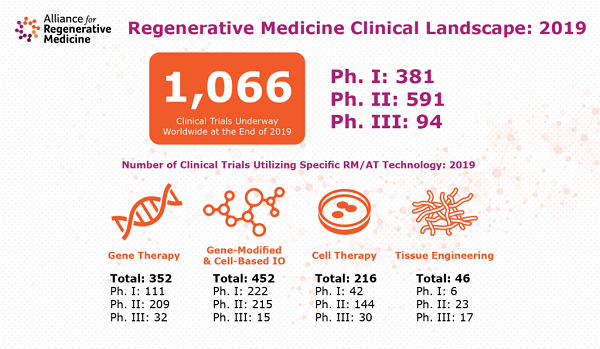ARM assesses pace of cellular, genetic and tissue therapy development
But: the growth number of companies is exceeding the growth of trials
The Alliance for Regenerative Medicines (ARM), in its annual review of advances in the fields of cellular and genetic therapies (CGTs), as well as tissue engineering, recorded a “great year” in 2019, and there is no question that the technology has enthralled researchers, providers, funders and patients alike. Notably, the amount of venture capital funding directed to the field jumped by 32% over the previous year, to $4.1 billion. But there are signs that, while these heady times are not declining, they do seem to be reaching a plateau.
credit: ARM

To wit: the number of trials (see figure) was up in 2019, to 1,066. But that is only 3.7% above the 2018 level (1,028 trials). At the same time, the number of companies entering the field grew from 906 to 987—an 8.9% increase. It’s not clear whether companies are forming before they have valid trials in sponsorship (although that is likely). ARM data also show that, cumulatively, trials are in roughly the same stages (Phases I, II and III) as last year; somewhat more Phase I, and just a couple more Phase III.
The hoped-for end of the trial stage, of course, is a newly approved therapy. ARM records three first approvals, and two expanded approvals, during the year, as well as 10 more that had marketing authorization filings, many of which are expected to be approved this year. So, progress is being seen.
Some other data to highlight:
- 657 (62%) of all current clinical trials are in oncology, including leukemia, lymphoma, and cancers of the brain, breast, bladder, cervix, colon, esophagus, ovaries, pancreas, and others.
- The second-highest category (57 trials) was central nervous system, just nosing out endocrine, metabolic and genetic disorders (55).
- Of the 987 companies, 534, or 54%, are in North America. Europe is the home of 237 companies, and Asia, 180.
- ARM, along with its data partner Informa, estimates that 4,500-5,000 patients have been treated to date with FDA or EMA approved CGTs.
The report can be accessed at ARM's website.